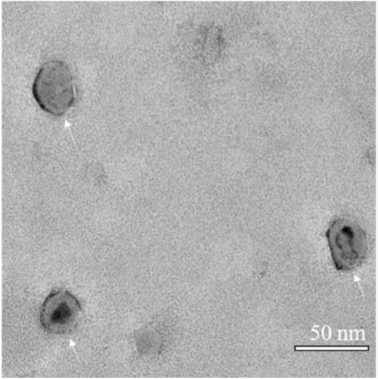Exosomes are a class of extracellular vesicles with a diameter of 50-150 nm, secreted by cells under physiological or pathological conditions. Exosomes have a double-layer membrane structure, and the main components include proteins, RNA, DNA, amino acids, and various metabolites. Milk-derived exosomes are safe, have a long half-life, easy to obtain, low immunogenicity, and high biocompatibility. Glycosylation of milk exosome surface proteins is essential for exosome cargo sorting and targeted transport.
 Figure 1. Electron-microscopic observation of milk exosomes. (Zhong et al. 2021)
Figure 1. Electron-microscopic observation of milk exosomes. (Zhong et al. 2021)
Proteins in cells undergo some form of covalent chemical modification during formation or after synthesis, i.e., protein post-translational modifications. The protein glycosylation modification process is complex, and glycans are assembled separately in the absence of a template through a series of individual catalytic reactions. Each glycosylation modification site can be linked to a different glycan modification with macroscopic inhomogeneity and microscopic inhomogeneity.
Lifeasible provides milk exosome glycomics analysis; the analysis of protein glycosylation is divided into two main directions: glycomics and glycoproteomics. These two directions take glycoconjugates and intact glycopeptides/glycoproteins as the objects of study, respectively. Through high-throughput and large-scale identification, we can comprehensively analyze the composition/structure of glycoconjugates and the types/glycosylation sites of glycoproteins, which can compensate for the defects of genomics and proteomics and obtain more modification information.
The object of glycomics analysis is mainly free glycan chains, and the service is divided into 4 main steps.
There are two main strategies for proteomics analysis based on biomass spectrometry, bottom-up and top-down. The specific studies are divided into four parts.
In addition to the above services, Lifeasible also provides other services related to exosomes, and we have the expertise to help you solve your project problems. If you are interested in our services, or if the service you want is not listed, please feel free to contact us, and we will get back to you as soon as possible.
Reference